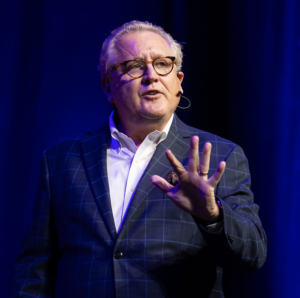
Marketers love talking about trust.
 We toss around phrases like “authenticity,” “emotional resonance,” and “earning customer loyalty” as if every purchase is a sacred relationship between buyer and brand.
We toss around phrases like “authenticity,” “emotional resonance,” and “earning customer loyalty” as if every purchase is a sacred relationship between buyer and brand.
But here’s the truth: I don’t trust most of the things I buy. I just buy them.
I don’t trust my gas station (I probably don’t even notice the brand). I don’t have a meaningful relationship with the person who stocked the bananas. I don’t need my new ladder to make me feel something.
It’s time to fill the tank with gas. I want a banana. I need a ladder. And then I want to be left alone. I don’t want branded content, net promoter surveys, or a brand community.
So what gives? Is all this “trust marketing” talk a bunch of fluff?
Not exactly.
But let’s stop pretending that every product, brand, or moment requires emotional depth. Because marketing isn’t a single tool. It’s a spectrum of strategies, and trust is just one part of the picture.
The Two Faces of Marketing
At its core, marketing is about creating customers. But there are two fundamentally different ways we do that:
1. Performance Marketing
This is transactional. It’s about showing up at the right time, solving a real need, and moving on.
Examples:
- Google Ads for “urgent care near me”
- A $5 coupon for a wrench at Home Depot
- Bananas on sale at the endcap at your grocery store
No trust. No loyalty. No emotional arc. Just commerce.
2. Brand Marketing
This is the long-term play. It’s about emotional preference, identity, and recall.
Examples:
- Buying Patagonia over another cheaper jacket because you believe in their environmental story
- Lining up for hours to buy a new iPhone
- Knowing that “Nike” feels different from “Puma” even if the shoes are basically the same
Here, trust does matter. So does consistency, storytelling, and human connection.
Most companies employ a blend of these two marketing strategies. Start-ups may emphasize performance marketing to fill their sales pipeline. More established brands will focus almost entirely on brand marketing to create distance between their products and the competition.
Many everyday products don’t need brand marketing. They just need to be visible, relevant, and frictionless.
And that’s okay.
The Myth of Universal Trust
When I buy petrol, a banana, or a ladder, it doesn’t mean marketing isn’t at work — it just means it’s not obvious.
Somewhere behind the scenes, someone:
- Decided which bananas get top shelf space
- Sets the pricing strategy
- Designed the end cap packaging
- Built a reliable supply chain to deliver fresh fruit to your store
That’s marketing. It’s not flashy. It’s not emotional. But it’s real.
When I was a B2B marketing leader, I spent most of my time in transportation, accounting, and customer service, seeking ways to serve our customers better and improve our profit margin. Not very Hollywood, but a challenging job that required insight and creativity. I never won a Cannes Lion Award, but I created significant value for my company.
A Better Definition of Marketing
One of the most popular definitions of marketing is “Marketing is earning trust at scale.”
That is so oversimplified. It more or less overlooks the classic “Four Ps” of marketing, which still work really well! It overlooks the fact that I was a highly successful B2B marketer by keeping my head buried in spreadsheets all day long!
Here’s a definition that I think works better:
Marketing is the process of creating customers—through visibility, relevance, or desire.
Twelve words. No fluff. It holds up for pencils and Porsches.
Sometimes, we create a customer by showing up at the perfect time.
Sometimes, we do it by building a story that lodges in the heart.
Sometimes, we just put a banana where people expect to find one.
Final Thought: Let’s Respect the Whole Spectrum
If you’re selling designer jewelry, storytelling matters.
If you’re selling windshield wipers, trust probably isn’t the hurdle — visibility is.
So let’s retire the idea that trust is the only game in town. Let’s build brands when it makes sense.
Let’s optimize transactions when that’s what the customer wants. Let’s remember that some people just want to buy their banana and go home.
Normally, I write about what’s next in the marketing world. But there is always SO MUCH confusion about the essence of marketing that I wanted to pause and ground the discussion. There is too much navel-gazing about storytelling, AI strategy, TikTok, and even trust. Marketing is so much more.
The best marketers know how to use every tool in their toolbox, at the right place, at the right time.
 Need a keynote speaker? Mark Schaefer is the most trusted voice in marketing. Your conference guests will buzz about his insights long after your event! Mark is the author of some of the world’s bestselling marketing books, a college educator, and an advisor to many of the world’s largest brands. Contact Mark to have him bring a fun, meaningful, and memorable presentation to your company event or conference.
Need a keynote speaker? Mark Schaefer is the most trusted voice in marketing. Your conference guests will buzz about his insights long after your event! Mark is the author of some of the world’s bestselling marketing books, a college educator, and an advisor to many of the world’s largest brands. Contact Mark to have him bring a fun, meaningful, and memorable presentation to your company event or conference.
Follow Mark on Twitter, LinkedIn, YouTube, and Instagram
Image courtesy Mid Journey


